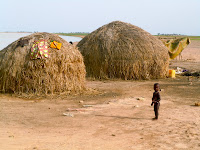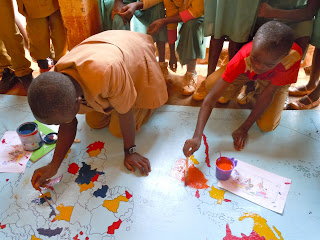
Here are photos of the solar panel project where with the help of an RPCV, an NGO, and my host organization, we were able to install 2 80-kW solar panels at an orphanage. The orphanage is located in the tiny village of Bandzuidjong (population of 100). It takes an hour on a moto bushwhacking along a tiny made-up path into the jungle to get to the village. Once you’re there, it is gorgeous with rain forest covered mountains all around. The orphanage sits on a hill overlooking the village. There are about 20 orphans residing at this location, although the orphanage has 2 sister orphanages located in cities nearby.
I recently went to visit the orphanage to see how the panels were working now in the heart of rainy season. Even with daily downpours, the panels (and batteries) are able to produce enough power to keep 20 lights illuminated all through the night! The kids were thrilled because they said that no more snakes enter the house because they are afraid of the light. The orphanage director is delighted because they can now use evening hours (the sun sets by 6:30 pm here) for study time. It was a really fun project to do and I hope to do more soon!









































